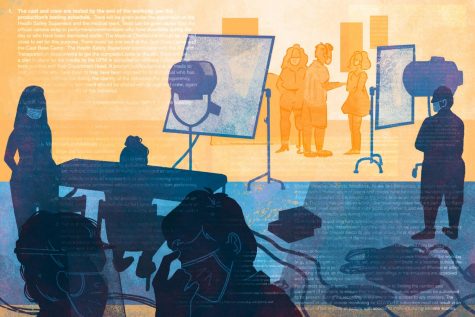Columbia reevaluates film production strategy amid new state guidelines
July 2, 2020

As Illinois moves into phase four of Gov. J.B. Pritzker’s five-phase reopening plan, film production has resumed following a new set of required coronavirus safety guidelines published by the Illinois Film Office.
On June 22, the Illinois Film Office released its set of guidelines, which detail key steps productions should take to mitigate exposure to the coronavirus, or COVID-19. The guidelines range from mandatory temperature checks to reduced capacity on sound stages and remote casting.
The Directors Guild of America, a film and television union, also released its own set of guidelines for film production. While these suggestions are not mandated, many productions have begun to adopt them.
Avi Zephyra, a senior cinema arts and science major, had been working on two independent short films before the pandemic began. He said suggestions made by the DGA have been extremely helpful in deciding what will be required on future film sets.
“Obviously, everyone’s going to be wearing masks. Gloves will be used in certain situations, face shields will be required for putting on makeup and things like that,” Zephyra said. “Our productions are requiring all people to get tested before even coming on set.”
Zephyra said it is likely a new category in a film’s budget is going to be made for coronavirus-related expenditures, including masks and hand sanitizer stations.
Carolina Posse, an assistant professor in the Cinema and Television Arts department, said the biggest challenge the new guidelines present is how they will impact a production’s shooting schedule.
Posse said most advanced Columbia productions shoot four days out of a five-day window.
“We have to rethink how to [shoot], for the safety of our students and all the employees at Columbia,” Posse said. “So maybe the four day restriction might not necessarily apply anymore. The students are going to work slower. They should work slower in order to keep the distance.”
Mayank Mishra, a junior filmmaking major, worked on a number of sets during quarantine and is well-versed in the roadblocks and costs these regulations present.
Mishra said while he believes Columbia productions can follow most of the regulations, such as wearing masks, it’s unlikely they will be able to follow them “100%.”
“There were so many moments where I was like, sucking air, because of the mask,” Mishra said. “Stands are heavy, so I had to take my mask down.”
Mishra said because the overall price of film production is going to rise with new regulations, he expects productions to rely on smaller and more experienced crews.
“I’m glad I got my footing in the game. I would not want to be a freshman [right now],” Mishra said.
In its document “The Safe Way Forward,” the DGA outlines “The Zone System,” a new way to structure film sets, designed to combat the spread of COVID-19.
“The Zone System” creates designated “zones,” titled Zones A, B and C, associated with a certain level of clearance, in order to limit the amount of people in one space at any given time. For example, the director and other department heads would be cleared for Zone A, while general crew would only be able to move in Zone B.
Zephyra said while the system sounds great in theory, the challenge is making it work in the small interior spaces where Columbia filmmakers are often required to shoot. Despite the difficulty, Zephyra plans to implement the Zone System on both of his productions.
The DGA also suggests appointing of a “COVID-19 Compliance Officer,” a new position responsible for enforcing safety practices. Posse said she is unsure if Columbia is ready to adopt the novel position yet, as she has only seen industry job postings requiring somebody with EMT, military or nursing experience.
In the case the position becomes mandated, Posse said the college would most likely have to hire someone, as it would be too much responsibility to place on one safety supervisor on set, who is typically a student.
While some regulations may be difficult to apply in practice, Posse said she has been impressed with the way the Illinois Film Office has handled filming during the pandemic and how students have responded to the ongoing changes.
“This has been quite a roller coaster ride for all of us,” Posse said. “Looking at it in [a] positive lens, all the changes that we will implement curriculum wise, schedule wise, are going to be ultimately for the better.”







